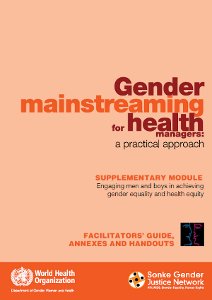Sonke’s Policy, Advocacy and Research Unit and the World Health Organization’s Department of Women, Gender and Health recently developed a training module on Engaging Men and Boys in achieving Gender Equality and Health Equity. This is the first ever such module of its kind addressing men and boys on these issues, and forms part of the WHO Gender Mainstreaming for Health Managers: A Practical Approach series.
The module is part of a set of documents Sonke produced for the WHO including an information pack on men, gender equity and health, and a policy brief for policy makers on men, gender equality and health equity. The training guide seeks to build the skills, knowledge and understanding necessary for the development, implementation and monitoring of evidence-informed policies and programmes intended to:
increase men’s participation in achieving gender equality and health equity,
- strengthen men’s support for their partners’ and families’ use of health services, and
- increase men’s own use of health services.
- engaging men and boys in achieving gender equality health equity;
- increasing participants’ knowledge regarding key gender concepts, and the gender and health consequences of gender stereotypes and associated practices for men.
- building understanding on the importance of engaging men and boys in achieving gender equality and health equity, and reviews research evidence showing that gender work with men and boys can transform men’s gender- and health-related attitudes and behaviour.
Work with men has demonstrated significant potential in contributing to building gender equality and improving the health of women and men. However, most work with men has tended to be local in scale and limited in scope. Being more widely effective in transforming the pervasive gender inequality that characterizes many societies globally requires significantly scaling up efforts to transform men’s behaviour. Policy processes and mechanisms are key elements in any effort to engage men and boys in achieving gender equality.
Social constructions of manhood play a central role in affecting the health of both women and men. Women’s health is impacted in that social constructions of manhood shape men’s attitude to, and involvement in, gender-based violence, sexual and reproductive health, maternal health and HIV and AIDS.
Gender norms also impact negatively on men’s health as health-seeking behaviour can be perceived as weak, according to hegemonic notions of masculinity, therefore causing men to be more reluctant to visit clinics, go for health check-ups, test for HIV, access HIV treatment or seek information and counselling. Gender norms also contribute to men’s high rates of accidental death, due to car accidents, or accidents experienced through dangerous occupations, as a result of a gendered division of labour.
This initiative targets those working on issues related to gender and health, particularly staff in national Public Health Departments and Ministries of Health, WHO and other UN and multinational agencies, and in national and international NGOs/ civil society organisations.
Remarkably, the module reviews international commitments and agreements on working with men and boys to achieve gender equality and equity, highlights why it is critical that policies be developed to increase the scale, scope and sustainability of work with men and boys, and discusses the key principles and features of successful policies and programmes on working with men and boys.
Notably, the module also discusses the challenges related to implementation and possible solutions. In addition, the module also provides participants with the opportunity to explore their own values and attitudes through challenging stereotypes that impede the development of policies and programmes aimed at involving men in gender equality.
A Unique Combination of Resources and Materials
The module is interactive, with a diverse range of activities. The Facilitator’s Guide comes with a range of complementary materials necessary to facilitate a workshop, including a PowerPoint Presentation. The module has been piloted all over the world, and Sonke assisted in the pilot training which took place in Pretoria in February 2011. Adjustments to the module were made by Sonke and WHO according to assessments of the pilot trainings and the module has now been finalised.
Once printed, Sonke intends to distribute the module widely and use it to run a range of training events. This process will further strengthen Sonke’s links with WHO and other UN country office staff, as well as government officials across the region. The module will also be made available through the Sonke and WHO websites. Sonke believes this initiative will further support the skills building that is needed are we to truly advance gender transformative work with men within Africa.

 increase men’s participation in achieving gender equality and health equity,
increase men’s participation in achieving gender equality and health equity,